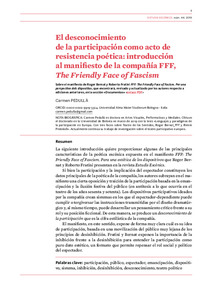The Ignorance of Participation as an Act of Poetic Resistance: Introduction to the Manifest of the Company FFF: "The Friendly Face of Fascism"
Metadata
Show full item record
Estudis escènics: quaderns de l'Institut del Teatre. 2019, Núm. 44
Document typeArticle
Abstract
<p>The following introduction seeks to provide some of the main characteristics of the scenic poetics set out in the manifest "FFF: The Friendly Face of Fascism. For an Aesthetics of Devices" that Roger Bernat and Roberto Fratini present in the journal <em>Estudis Escènics</em>.</p>
<p>Although the participation and involvement of the spectator are the main features of the poetics of the company, the authors emphasise in the manifest certain opposition to and betrayal of participation based on the emancipation and festive illusion of the audience (in opposition to what happened in 1960s and 1970s theatre). The participatory devices conceived by the company create systems in which the spectators-dependants can fulfil or distort the instructions conveyed by the dramaturgical design while being able to develop critical thought faced with their role and fictional stance. In this way, there is an <em>ignorance of participation</em>, which is the company’s stylistic hallmark.</p>
<p>The manifest, in this respect, very clearly sets out its idea of participation, based on a mobilisation of the audience far removed from the principles of disinhibition. Fratini and Bernat stress the importance of inhibition faced with disinhibition to understand participation as pure aesthetic data, a format that enables the social and political role of the spectators to be re-imagined.</p> <p>La siguiente introducción quiere proporcionar algunas de las principales características de la poética escénica expuesta en el manifiesto <em>FFF: The Friendly Face of Fascism. Para una estética de los dispositivos</em> que Roger Bernat y Roberto Fratini presentan en la revista <em>Estudis Escènics</em>.</p>
<p>Si bien la participación y la implicación del espectador constituyen los datos principales de la poética de la compañía, los autores subrayan en el manifiesto una cierta oposición y traición de la participación basada en la emancipación y la ilusión festiva del público (en antítesis a lo que ocurría en el teatro de los años sesenta y setenta). Los dispositivos participativos ideados por la compañía crean sistemas en los que el espectador-dependiente puede cumplir o tergiversar las instrucciones transmitidas por el diseño dramatúrgico y, al mismo tiempo, puede desarrollar un pensamiento crítico frente a su rol y su posición ficcional. De esta manera, se produce un <em>desconocimiento de la participación</em> que es la cifra estilística de la compañía.</p>
<p>El manifiesto, en este sentido, expone de forma muy clara cuál es su idea de participación, basada en una movilización del público muy lejana de los principios de desinhibición. Fratini y Bernat exponen la importancia de la inhibición frente a la desinhibición para entender la participación como puro dato estético, un formato que permite repensar el rol social y político del espectador.</p>
Access conditionsOpen Access
ISSN2385-362X
,
0212-3819
Collections
- 2019: Núm.: 44 [22]


